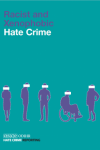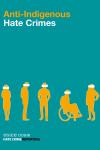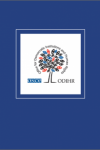Racist and xenophobic hate crime
Racism is prejudice or hostility towards a person's race, colour, language, nationality, or national or ethnic origin. While some communities are particularly vulnerable, any ethnic group can be the target of racism. Intolerant discourse in the media or from politicians can lead to increased racist sentiments towards migrants and other minorities, including in the form of scapegoating in times of economic crisis. ODIHR's annual reporting on hate crime in the OSCE area has demonstrated that racist attacks can take a range of forms, targeting people from diverse groups across the region. Violent attacks by groups of perpetrators against migrants and ethnic minorities, as well as damage to businesses and property owned by or associated with established ethnic communities are common features of this type of crime.
States that report
Incidents were reported on these states
International Reports
Austria
The UN Human Rights Council, in its Universal Periodic Review, encouraged Austria to establish a comprehensive system for recording and monitoring racist crimes. It also encouraged increased efforts to combat violence and discrimination against Roma.
Azerbaijan
The European Commission against Racism and Intolerance (ECRI) recommended that Azerbaijan establish a system for systematic monitoring of incidents of racial violence and improve the information available to it concerning racist crime.
Bosnia and Herzegovina
The Commissioner for Human Rights of the Council of Europe expressed concern about ongoing incidents and reports of ethnically motivated violence in Bosnia and Herzegovina that act as a barrier for returnee communities.
Croatia
The UN Human Rights Council encouraged Croatia to continue its efforts to create specially trained police units to investigate hate crimes, which have resulted in an increase in the investigation of hate crimes.
Cyprus
The European Commission against Racism and Intolerance (ECRI) recommended that Cyprus train prosecutors and judges in relation to hate crime and other forms of discrimination; ensure all acts of racist violence are thoroughly investigated for appropriate prosecution and punishment; and improve its hate crime data-collection system, noting that the recorded number of racially motivated incidents is low compared with reports of such incidents in the community.
Czech Republic
UN Committee on the Elimination of Racial Discrimination (CERD) recommended that the Czech Republic conduct effective investigation and prosecutions of hate crimes. It also encouraged the investigation of anti-Roma violence in the Czech Republic, ensuring that the perpetrators are identified, prosecuted and appropriately punished, and recommended the active recruitment of Roma to law enforcement.
Denmark
The UN Human Rights Council, in its Universal Periodic Review, encouraged Denmark to take measures to protect vulnerable groups from hate crimes, noting the launch of an awareness-raising campaign to increase reporting of hate crimes.
Georgia
The UN Committee on the Elimination of Racial Discrimination (CERD) recommended that Georgia amend legislation to ensure racist motivation is considered an aggravating circumstance for all crimes; conduct awareness-raising campaigns on criminal laws on hate crime; deliver training for the criminal justice system (police, prosecutors and judges); and collect disaggregated hate crime data.
Greece
The UN Human Rights Council encouraged Greece to ensure racially motivated crimes are effectively prosecuted and punished.
UNHCR in Greece, together with the National Commission for Human Rights, set up a Network for Recording Incidents of Racist Violence. Eighteen NGOs and other bodies, including the main human rights and refugee rights organizations, participated in the network. Recognizing the need to use a common and reliable recording tool, the network drafted and adopted a “Racist Incident Record Form”. In October, the network launched a pilot programme aimed at systematically recording racially motivated acts of violence.
Hungary
The UN Special Rapporteurs on the Promotion and Protection of the Rights to Freedom of Opinion and Expression, and on Contemporary Forms of Racism, Racial Discrimination, Xenophobia and Related Intolerance expressed concerns about xenophobia, racism and related intolerance encountered by refugees and asylum-seekers in Hungary.
The UN Human Rights Council, during its Universal Periodic Review, encouraged Hungary to take measures to prevent and combat hate crime; to ensure training for police, prosecutors and judges; and to effectively investigate and prosecute racially motivated violence and other hate crimes. It encouraged increased efforts to combat violence and discrimination against Roma and recommended that Hungary strengthen hate crimes laws to prevent violence committed on the grounds of sexual orientation and gender identity.
Iceland
The European Commission against Racism and Intolerance (ECRI) recommended that Iceland introduce provisions in criminal law that expressly consider racist motivation as an aggravating circumstance of an offence, and strengthen in-service and initial training for police, prosecutors and judges on recognizing racist motivation.
Ireland
The UN Committee on the Elimination of Racial Discrimination (CERD) recommended that Ireland create systems to encourage reporting of hate crimes; ensure racist motivation is consistently taken into account in sentencing for bias crimes; and deliver training for judiciary on racist crimes.
The UN Human Rights Council encouraged Ireland to develop a training programme for the judiciary to ensure judges take into account racist motivation in sentencing; to establish a system to encourage reporting of racist crimes; and to investigate the reports of knife stabbings of people of African descent, ensuring the perpetrators are prosecuted and appropriately punished.
Italy
The European Commission against Racism and Intolerance (ECRI) recommended that Italy intensify efforts to monitor hate crimes and adopt a broader definition of racist incidents that would include any incident that is perceived as such by the victim or any other person, noting that the current approach, in which official figures are recorded according to the perception of law enforcement, most likely under-represents the number of actual hate crimes. ECRI also noted cases of violence against Roma and migrants, especially those from Africa, Asia and Romania, in its fourth periodic report on Italy.
Latvia
The European Commission against Racism and Intolerance (ECRI) recommended that Latvia strengthen training on hate crimes for police, judges and prosecutors. In its adopted reports for 2011, ECRI noted cases of violence against Roma and of damage to property and a monument in Latvia.
The UN Human Rights Council, in its Universal Periodic Review, encouraged Latvia to intensify its efforts to combat hate crime, noting improved criminal law provisions and training. It also recommended that Latvia consider legislative measures to recognize violence against people on the basis of their sexual orientation or gender identity.
Lithuania
The UN Committee on the Elimination of Racial Discrimination (CERD) recommended that Lithuania ensure hate crimes are effectively prosecuted and punished, including providing remedies to victims and conducting awareness-raising campaigns.
The European Commission against Racism and Intolerance (ECRI) recommended that Lithuania include systems for better monitoring and continue training of police, lawyers, judges and prosecutors on hate crime provisions, noting improvements to legislation and the system for recording criminal acts motivated by racism.
The UN Human Rights Council, in its Universal Periodic Review, encouraged Lithuania to further strengthen its measures to investigate and prosecute hate crimes, noting that the criminal law has already been amended to include racial motivation as an aggravating circumstance in all crimes. It also recommended that Lithuania take measures to prevent and prosecute violence and harassment on the grounds of sexual orientation and gender identity.
Moldova
The UN Committee on the Elimination of Racial Discrimination (CERD) recommended that Moldova ensure hate crimes are effectively prosecuted and punished. It noted the need for better response by Moldovan authorities to anti-Semitic incidents, including vandalism of religious sites and it encouraged Moldova to prevent acts directed at minorities or the religious sites of minorities and to investigate and prosecute these cases when they do occur.
The UN Human Rights Council, in its Universal Periodic Review, encouraged Moldova to further strengthen measures to prevent and investigate hate crimes, including against LGBT people.
Montenegro
The European Commission against Racism and Intolerance (ECRI) recommended that Montenegro strengthen initial and in-service training for police, lawyers, public prosecutors and judges on issues related to hate crime.
Norway
The UN Committee on the Elimination of Racial Discrimination (CERD) recommended that Norway provide more information on judicial statistics on prosecution, convictions and sentences on racist acts, noting a considerable lack of such information.
Russian Federation
UNHCR in Russia coordinated and contributed to a number of activities related to its commitment to “reduce the level of xenophobic attitudes, frequent manifestations of xenophobia and migrant-phobia in Russian society, especially among youth”. These included contributing to an international/regional seminar “Towards a Coherent National Policy to Prevent and Combat Racial Discrimination and Related Intolerance: Developing and Implementing National Action Plans”, coordinating a set of eight programmes devoted to tolerance issues entitled, “New Place of Residence” on the UNHCR sponsored, nationwide channel Radio of Russia, and working with a local NGO to award diplomas for the best project on tolerance relating to refugees and migrants at a regular international competition: “Dialogue – Road to Understanding”.
Serbia
The UN Committee on the Elimination of Racial Discrimination (CERD) recommended that Serbia enact specific legislation on hate crimes and intensify enforcement against racially motivated crimes.
The European Commission against Racism and Intolerance (ECRI) recommended that Serbia ensure more vigorous implementation of criminal law in cases of racist crime, strengthen judicial training on issues relating to racist crime and encourage witnesses and victims to report hate crimes. ECRI also expressed concern about violent attacks against religious minorities, especially Jehovah’s Witnesses and Adventists in Serbia.
Slovakia
The Council of Europe Commissioner for Human Rights visited Slovakia, where he expressed concern about hate crimes targeting the Roma population. His recommendations included adopting a broad definition of “racist incident” so that police are required to investigate potential racist motivation as soon as such incidents are reported and having authorities unequivocally and publicly condemn attacks against Roma as unacceptable in Slovak society, whenever they occur. He aslo called on the authorities to address shortcomings in the implementation of the criminal law against racially-motivated violence, notably the provision that establishes racial motivation as an aggravating circumstance in respect of all crimes.
Spain
The UN Committee on the Elimination of Racial Discrimination Committee (CERD) recommended that Spain provide more details in its next report on judicial statistics on prosecutions, convictions and sentences for racially motivated crimes, noting a considerable lack of such information.
Ukraine
UN Committee on the Elimination of Racial Discrimination (CERD) recommended that Ukraine re-activate its working group on xenophobia and ethnic and racial intolerance, as well as systems for investigating and combating ethnic crimes; effectively investigate reported hate crimes and ensure that police refrain from racial profiling; prosecute and punish hate crimes; and expand human rights training for law-enforcement authorities.
The European Commission against Racism and Intolerance (ECRI) recommended that Ukraine ensure that racist offences are consistently reported and recorded in the criminal justice system as a means to improve tracking of cases across the criminal justice system; intensify its efforts to combat bias-motivated violence through effective punishment; and deliver training for all criminal justice system agencies on implementing criminal provisions. In its adopted reports for 2011, ECRI noted cases of violence against Roma in Ukraine.
United States of America
The UN Human Rights Council, in its Universal Periodic Review, encouraged the United States to ensure prosecution, punishment and fair compensation to victims under the law for cases of racial and xenophobic violence. It also encouraged the United States to take effective measures to counter violence against Muslims and recommended that the United States conduct awareness-raising campaigns to address violence against LGBT people.
OSCE Region
The UN General Assembly adopted Resolution 65/249, as part of the follow-up to the Durban Declaration, which addressed the state’s responsibility to address hate crime, noting the need to adopt effective measures to combat criminal acts motivated by racism, xenophobia and related intolerance, including adopting measures to ensure that such motivations are considered as aggravating circumstances for sentencing purposes.
The UN Human Rights Council adopted Resolution 18/15, on the incompatibility between democracy and racism, which recognizes that groups in vulnerable situations, such as migrants, refugees, asylum-seekers and people belonging to national, ethnic, religious and linguistic minorities, are subject to violence from extremist groups, and emphasizes states’ obligation to prevent crimes against migrants perpetrated with racist or xenophobic motivations, and to investigate and punish such crimes.
In a report on contemporary forms of racism, racial discrimination, xenophobia and related intolerance and the implementation of General Assembly Resolution 65/199, the UN Special Rapporteur on Racism made a number of recommendations with regard to combating hate crimes, including ensuring that racial motivation is considered an aggravating circumstance under law and that such crimes are properly investigated and sanctioned. He also encouraged awareness-raising about hate crimes, especially with regard to victims’ rights to judicial remedies and engagement with affected communities. In addition, the Special Rapporteur highlighted the lack of disaggregated data as an obstacle to addressing racist crimes.
In his 2011 report on the human rights of migrants, the Special Rapporteur noted with concern that migrants face increasing intolerance and are vulnerable to potential racist and xenophobic violence, especially in cases where their irregular status makes them unable or afraid to seek protection.


